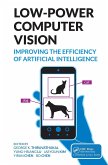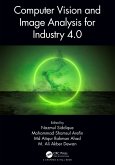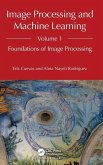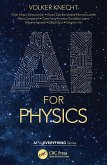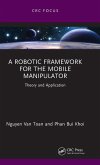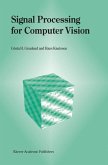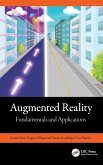Computer Vision
Challenges, Trends, and Opportunities
Herausgeber: Turk, Matthew; Mahbub, Upal; Hartley, Richard; Ahad, Md Atiqur Rahman
Computer Vision
Challenges, Trends, and Opportunities
Herausgeber: Turk, Matthew; Mahbub, Upal; Hartley, Richard; Ahad, Md Atiqur Rahman
- Gebundenes Buch
- Merkliste
- Auf die Merkliste
- Bewerten Bewerten
- Teilen
- Produkt teilen
- Produkterinnerung
- Produkterinnerung
The book highlights various core challenges, constructive criticism, and solutions by leading researchers in the field. It covers timely and important aspects of computer vision and its applications, highlighting the challenges ahead and providing a range of perspectives, from top researchers around the world.
Andere Kunden interessierten sich auch für
![Low-Power Computer Vision Low-Power Computer Vision]() Low-Power Computer Vision110,99 €
Low-Power Computer Vision110,99 €![Computer Vision and Image Analysis for Industry 4.0 Computer Vision and Image Analysis for Industry 4.0]() Computer Vision and Image Analysis for Industry 4.0134,99 €
Computer Vision and Image Analysis for Industry 4.0134,99 €![Image Processing and Machine Learning, Volume 1 Image Processing and Machine Learning, Volume 1]() Erik CuevasImage Processing and Machine Learning, Volume 1113,99 €
Erik CuevasImage Processing and Machine Learning, Volume 1113,99 €![AI for Physics AI for Physics]() Volker KnechtAI for Physics162,99 €
Volker KnechtAI for Physics162,99 €![A Robotic Framework for the Mobile Manipulator A Robotic Framework for the Mobile Manipulator]() Nguyen Van ToanA Robotic Framework for the Mobile Manipulator66,99 €
Nguyen Van ToanA Robotic Framework for the Mobile Manipulator66,99 €![Signal Processing for Computer Vision Signal Processing for Computer Vision]() Gösta H. GranlundSignal Processing for Computer Vision121,99 €
Gösta H. GranlundSignal Processing for Computer Vision121,99 €![Augmented Reality Augmented Reality]() Osslan Osiris Vergara VillegasAugmented Reality116,99 €
Osslan Osiris Vergara VillegasAugmented Reality116,99 €-
-
-
The book highlights various core challenges, constructive criticism, and solutions by leading researchers in the field. It covers timely and important aspects of computer vision and its applications, highlighting the challenges ahead and providing a range of perspectives, from top researchers around the world.
Hinweis: Dieser Artikel kann nur an eine deutsche Lieferadresse ausgeliefert werden.
Hinweis: Dieser Artikel kann nur an eine deutsche Lieferadresse ausgeliefert werden.
Produktdetails
- Produktdetails
- Chapman & Hall/CRC Computer Vision
- Verlag: Taylor & Francis Ltd
- Seitenzahl: 348
- Erscheinungstermin: 30. Juli 2024
- Englisch
- Abmessung: 286mm x 215mm x 24mm
- Gewicht: 1186g
- ISBN-13: 9781032317052
- ISBN-10: 1032317051
- Artikelnr.: 70146747
- Herstellerkennzeichnung
- Libri GmbH
- Europaallee 1
- 36244 Bad Hersfeld
- gpsr@libri.de
- Chapman & Hall/CRC Computer Vision
- Verlag: Taylor & Francis Ltd
- Seitenzahl: 348
- Erscheinungstermin: 30. Juli 2024
- Englisch
- Abmessung: 286mm x 215mm x 24mm
- Gewicht: 1186g
- ISBN-13: 9781032317052
- ISBN-10: 1032317051
- Artikelnr.: 70146747
- Herstellerkennzeichnung
- Libri GmbH
- Europaallee 1
- 36244 Bad Hersfeld
- gpsr@libri.de
Md Atiqur Rahman Ahad, Ph.D., Senior Member, IEEE, Senior Member, OPTICA (formerly OSA), is a Professor of Electrical & Electronic Engineering, University of Dhaka (DU). He is currently working as a specially appointed Associate Professor at Osaka University, Japan. He works on computer vision, imaging, IoT, healthcare, etc. He was awarded the prestigious UGC Gold Medal (handed by Honorable President of Bangladesh in 2018), JSPS Postdoctoral Fellowship, and a no. of awards/scholarships. He was a Visiting Researcher at KIT. He has published over ten books and ~200 journal articles, conference papers and book chapters. He has received ~40 international awards in various conferences/journals/societies. Ahad was invited as keynote/invited speakers ~110 times in different conferences/universities. He has established several international MOU/collaborations (e.g., Clemson University, University of Hyogo, RCCIIT, Fukuoka Women University, Kyushu University, etc.). Website: http://ahadVisionLab.com Upal Mahbub, Ph.D., Senior Member IEEE, is currently working as a Senior Engineer at the Multimedia R&D Lab at Qualcomm Technologies Inc., San Diego, California, USA. He received his Ph.D. (2018) and an M.Sc. (2017) degrees in Electrical and Computer Engineering from the University of Maryland College Park. Before joining the Ph.D. program, Dr. Mahbub was an Assistant Professor at the Dept. of EEE, Bangladesh University of Engineering and Technology, Dhaka, Bangladesh. Upal Mahbub is the recipient of the best paper award at IEEE UEMCON 2016, the best poster award at BTAS 2016, the best paper award at ICCIT 2011, and a distinguished graduate fellowship from the A. James Clark School of Engineering at the University of Maryland. He has published over thirty articles in international conferences and prestigious journals, recently published an edited book entitled "Contactless Human Activity Analysis", served as editor in international journals (guest editor of PRL special issue AHAAGR 2021, associate editor of IJCVSP), presented his research at numerous conferences, and served in the technical and/or program committees of ICIEV (2012-2021), IVPR (track chair 202, program chair 2021), ICECE (2010 & 2012), and ABC (2019, 2020, 2021). Matthew Turk, Ph.D., Fellow, IEEE; Fellow, Fellow IAPR, is the President of the Toyota Technological Institute at Chicago (TTIC) and an emeritus professor in computer science at the University of California, Santa Barbara, where he co-directed the UCSB Four Eyes Lab. He received a PhD from the Massachusetts Institute of Technology. He has worked at Martin Marietta Aerospace, LIFIA/ENSIMAG (Grenoble, France), Teleos Research, and Microsoft Research, where he was a founder of the Vision Technology Group. He has served as General or Program Chair of several major conferences, including the ACM Multimedia Conference, the IEEE Conference on Automatic Face and Gesture Recognition, the ACM International Conference on Multimodal Interaction, the IEEE Conference on Computer Vision and Pattern Recognition, and the IEEE Winter Conference on Applications of Computer Vision. He co-founded an augmented reality startup company in 2014 that was acquired by PTC Vuforia in 2016. Dr. Turk has received several best paper awards, and he is an ACM Fellow, an IEEE Fellow, an IAPR Fellow, and the recipient of the 2011-2012 Fulbright-Nokia Distinguished Chair in Information and Communications Technologies. Richard Hartley, Ph.D., Fellow, IEEE; Fellow, Australian Academy of Science; Fellow, Australian Mathematical Society, is a member of the computer vision group in the Department of Information Engineering, at the Australian National University, where he has been since January 2001. He did his doctoral research in Mathematics at the University of Toronto, Canada in 1976. He also received an MSc in Mathematics from the same university in 1972 and another MSc in Computer Science from Stanford University in 1985. Dr. Hartley worked at the General Electric Research and Development Center from 1985 to 2001. During the period 1985-1988, he was involved in the design and implementation of Computer-Aided Design tools for electronic design and created a very successful design system called the Parsifal Silicon Compiler. In 1991 he was awarded GE's Dushman Award for this work.
Foreword by Takeo Kanade 1 Some Challenges and Solutions in Data-Driven AI Rama Chellappa
Jiang Liu
Chun Pong Lau
and Prithviraj Dhar 2 Challenges of Computer Vision Research from an Industry Perspective Fatih Porikli 3 Soft Biometrics for Human Identication Mark S. Nixon and Emad Sami Jaha 4 Exploring Causes of Demographic Variations in Face Recognition Accuracy Gabriella Pangelinan
K.S. Krishnapriya
Vitor Albiero
Grace Bezold
Kai Zhang
Kushal Vangara
Michael C. King
and Kevin W. Bowyer 5 AI Knows What You Did Last Summer: Applications in Digital Forensics Jing Yang
José Nascimento
Gabriel Bertocco
Antonio Theophilo
Rafael Padilha
Aurea Soriano-Vargas
Fernanda A. Andaló
and Anderson Rocha 6 Advances in Computer Vision for Home-Based Stroke Rehabilitation 7 U-Net-based Medical Image Segmentation: A Comparative Analysis and Future Trends Sidike Paheding
Abel A. Reyes-Angulo
and Mohammad S. Alam 8 Robot-Mediated Assistance: Opportunities and Challenges in Computer Vision and Human-Robot Interaction Md Alimoor Reza and Syed Masum Billah 9 Computer Vision Applications in Underwater Robotics and Oceanography Md Jahidul Islam
Alberto Quattrini Li
Yogesh A Girdhar
and Ioannis Rekleitis 10 Applications of Computer Vision in Entertainment and Media Industry Mahmudul Hasan
Kishan Shamsundar Athrey
Arfeen Khalid
Danfeng Xie
Ehsan Younessian
and Tony Braskich 11 Quality Assessment in Media and Entertainment: Challenges and Trends Abhinau K. Venkataramanan
Zaixi Shang
Joshua P. Ebenezer
Meixu Chen
Zhengzhong Tu
and Alan C. Bovik 12 Immersive User Experiences: Trends and Challenges of Using XR Technologies Vasudev Bhaskaran and Upal Mahbub Kowshik Thopalli
Niccolo Meniconi
Tamim Ahmed
Sai Krishna Yeshala
Aisling Kelliher
Thanassis Rikakis
and Pavan Turaga 13 Multi-camera Bird's Eye View Perception for Autonomous Driving David Unger
Nikhil Gosala
Varun Ravi Kumar
Shubhankar Borse
Abhinav Valada
and Senthil Yogamani 14 The (Computer) Vision of Sports: Recent Trends in Research and Commercial Systems for Sport Analytics Rikke Gade
Michele Merler
Graham Thomas
and Thomas B. Moeslund 15 Spike-Based Neuromorphic Computing for Next-Generation Computer Vision Md Sakib Hasan
Catherine D. Schuman
Zhongyang Zhang
Tauhidur Rahman
and Garrett S. Rose
Jiang Liu
Chun Pong Lau
and Prithviraj Dhar 2 Challenges of Computer Vision Research from an Industry Perspective Fatih Porikli 3 Soft Biometrics for Human Identication Mark S. Nixon and Emad Sami Jaha 4 Exploring Causes of Demographic Variations in Face Recognition Accuracy Gabriella Pangelinan
K.S. Krishnapriya
Vitor Albiero
Grace Bezold
Kai Zhang
Kushal Vangara
Michael C. King
and Kevin W. Bowyer 5 AI Knows What You Did Last Summer: Applications in Digital Forensics Jing Yang
José Nascimento
Gabriel Bertocco
Antonio Theophilo
Rafael Padilha
Aurea Soriano-Vargas
Fernanda A. Andaló
and Anderson Rocha 6 Advances in Computer Vision for Home-Based Stroke Rehabilitation 7 U-Net-based Medical Image Segmentation: A Comparative Analysis and Future Trends Sidike Paheding
Abel A. Reyes-Angulo
and Mohammad S. Alam 8 Robot-Mediated Assistance: Opportunities and Challenges in Computer Vision and Human-Robot Interaction Md Alimoor Reza and Syed Masum Billah 9 Computer Vision Applications in Underwater Robotics and Oceanography Md Jahidul Islam
Alberto Quattrini Li
Yogesh A Girdhar
and Ioannis Rekleitis 10 Applications of Computer Vision in Entertainment and Media Industry Mahmudul Hasan
Kishan Shamsundar Athrey
Arfeen Khalid
Danfeng Xie
Ehsan Younessian
and Tony Braskich 11 Quality Assessment in Media and Entertainment: Challenges and Trends Abhinau K. Venkataramanan
Zaixi Shang
Joshua P. Ebenezer
Meixu Chen
Zhengzhong Tu
and Alan C. Bovik 12 Immersive User Experiences: Trends and Challenges of Using XR Technologies Vasudev Bhaskaran and Upal Mahbub Kowshik Thopalli
Niccolo Meniconi
Tamim Ahmed
Sai Krishna Yeshala
Aisling Kelliher
Thanassis Rikakis
and Pavan Turaga 13 Multi-camera Bird's Eye View Perception for Autonomous Driving David Unger
Nikhil Gosala
Varun Ravi Kumar
Shubhankar Borse
Abhinav Valada
and Senthil Yogamani 14 The (Computer) Vision of Sports: Recent Trends in Research and Commercial Systems for Sport Analytics Rikke Gade
Michele Merler
Graham Thomas
and Thomas B. Moeslund 15 Spike-Based Neuromorphic Computing for Next-Generation Computer Vision Md Sakib Hasan
Catherine D. Schuman
Zhongyang Zhang
Tauhidur Rahman
and Garrett S. Rose
Foreword by Takeo Kanade 1 Some Challenges and Solutions in Data-Driven AI Rama Chellappa
Jiang Liu
Chun Pong Lau
and Prithviraj Dhar 2 Challenges of Computer Vision Research from an Industry Perspective Fatih Porikli 3 Soft Biometrics for Human Identication Mark S. Nixon and Emad Sami Jaha 4 Exploring Causes of Demographic Variations in Face Recognition Accuracy Gabriella Pangelinan
K.S. Krishnapriya
Vitor Albiero
Grace Bezold
Kai Zhang
Kushal Vangara
Michael C. King
and Kevin W. Bowyer 5 AI Knows What You Did Last Summer: Applications in Digital Forensics Jing Yang
José Nascimento
Gabriel Bertocco
Antonio Theophilo
Rafael Padilha
Aurea Soriano-Vargas
Fernanda A. Andaló
and Anderson Rocha 6 Advances in Computer Vision for Home-Based Stroke Rehabilitation 7 U-Net-based Medical Image Segmentation: A Comparative Analysis and Future Trends Sidike Paheding
Abel A. Reyes-Angulo
and Mohammad S. Alam 8 Robot-Mediated Assistance: Opportunities and Challenges in Computer Vision and Human-Robot Interaction Md Alimoor Reza and Syed Masum Billah 9 Computer Vision Applications in Underwater Robotics and Oceanography Md Jahidul Islam
Alberto Quattrini Li
Yogesh A Girdhar
and Ioannis Rekleitis 10 Applications of Computer Vision in Entertainment and Media Industry Mahmudul Hasan
Kishan Shamsundar Athrey
Arfeen Khalid
Danfeng Xie
Ehsan Younessian
and Tony Braskich 11 Quality Assessment in Media and Entertainment: Challenges and Trends Abhinau K. Venkataramanan
Zaixi Shang
Joshua P. Ebenezer
Meixu Chen
Zhengzhong Tu
and Alan C. Bovik 12 Immersive User Experiences: Trends and Challenges of Using XR Technologies Vasudev Bhaskaran and Upal Mahbub Kowshik Thopalli
Niccolo Meniconi
Tamim Ahmed
Sai Krishna Yeshala
Aisling Kelliher
Thanassis Rikakis
and Pavan Turaga 13 Multi-camera Bird's Eye View Perception for Autonomous Driving David Unger
Nikhil Gosala
Varun Ravi Kumar
Shubhankar Borse
Abhinav Valada
and Senthil Yogamani 14 The (Computer) Vision of Sports: Recent Trends in Research and Commercial Systems for Sport Analytics Rikke Gade
Michele Merler
Graham Thomas
and Thomas B. Moeslund 15 Spike-Based Neuromorphic Computing for Next-Generation Computer Vision Md Sakib Hasan
Catherine D. Schuman
Zhongyang Zhang
Tauhidur Rahman
and Garrett S. Rose
Jiang Liu
Chun Pong Lau
and Prithviraj Dhar 2 Challenges of Computer Vision Research from an Industry Perspective Fatih Porikli 3 Soft Biometrics for Human Identication Mark S. Nixon and Emad Sami Jaha 4 Exploring Causes of Demographic Variations in Face Recognition Accuracy Gabriella Pangelinan
K.S. Krishnapriya
Vitor Albiero
Grace Bezold
Kai Zhang
Kushal Vangara
Michael C. King
and Kevin W. Bowyer 5 AI Knows What You Did Last Summer: Applications in Digital Forensics Jing Yang
José Nascimento
Gabriel Bertocco
Antonio Theophilo
Rafael Padilha
Aurea Soriano-Vargas
Fernanda A. Andaló
and Anderson Rocha 6 Advances in Computer Vision for Home-Based Stroke Rehabilitation 7 U-Net-based Medical Image Segmentation: A Comparative Analysis and Future Trends Sidike Paheding
Abel A. Reyes-Angulo
and Mohammad S. Alam 8 Robot-Mediated Assistance: Opportunities and Challenges in Computer Vision and Human-Robot Interaction Md Alimoor Reza and Syed Masum Billah 9 Computer Vision Applications in Underwater Robotics and Oceanography Md Jahidul Islam
Alberto Quattrini Li
Yogesh A Girdhar
and Ioannis Rekleitis 10 Applications of Computer Vision in Entertainment and Media Industry Mahmudul Hasan
Kishan Shamsundar Athrey
Arfeen Khalid
Danfeng Xie
Ehsan Younessian
and Tony Braskich 11 Quality Assessment in Media and Entertainment: Challenges and Trends Abhinau K. Venkataramanan
Zaixi Shang
Joshua P. Ebenezer
Meixu Chen
Zhengzhong Tu
and Alan C. Bovik 12 Immersive User Experiences: Trends and Challenges of Using XR Technologies Vasudev Bhaskaran and Upal Mahbub Kowshik Thopalli
Niccolo Meniconi
Tamim Ahmed
Sai Krishna Yeshala
Aisling Kelliher
Thanassis Rikakis
and Pavan Turaga 13 Multi-camera Bird's Eye View Perception for Autonomous Driving David Unger
Nikhil Gosala
Varun Ravi Kumar
Shubhankar Borse
Abhinav Valada
and Senthil Yogamani 14 The (Computer) Vision of Sports: Recent Trends in Research and Commercial Systems for Sport Analytics Rikke Gade
Michele Merler
Graham Thomas
and Thomas B. Moeslund 15 Spike-Based Neuromorphic Computing for Next-Generation Computer Vision Md Sakib Hasan
Catherine D. Schuman
Zhongyang Zhang
Tauhidur Rahman
and Garrett S. Rose


